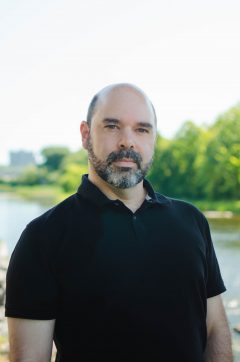Instructor Spotlight: Dr Tyler Avis

Tyler J. Avis
Associate Professor
Department of Chemistry (Food Science) and
Institute of Biochemistry
Bio
I have been a Food Science Professor in the Department of Chemistry since 2008. Prior to coming to Carleton, I worked as a Research Associate at Université Laval and as Director of Operations and Head of Microbiology of a biotechnology company.
Education
Ph.D. Plant Science, Université Laval
M.Sc. Plant Science, Université Laval
B.Sc.A. Agronomy, Université Laval
1.What is your area of interest/research?
I am a food and plant microbiologist interested in microbial food spoilage and plant pathology. My main research focus is the use of alternatives to synthetic chemical to control the growth of microorganisms on food crops and to reduce food spoilage.
2. What drew you to Food Sciences? What excites you about it?
I was always interested in plants and began working on food crops during my undergraduate degree. I then moved on to exploring the interactions (good and bad) of plants with microorganisms. That is where I developed a fascination with how to protect plants from harmful microorganisms.
3. Why is it important to society?
This is overly simplistic, but we all need to eat. While eating, we should not be ill from our food. And preserving food/extending shelf life of food is a small yet important part of food security worldwide. More specifically, my work focuses on overcoming our reliance on synthetic chemicals in food production and preservation. In essence, I look for alternatives to overcome drawbacks to the use of synthetic chemicals in food crops. These drawbacks include health and environmental risks, as well as the development of resistance, which may render these chemicals useless.
4. What course(s) do you teach? What is your favourite course to teach and why?
I teach three courses. I like them all for different reasons. My introductory course on Food Science at the undergraduate level is the first course Carleton’s Food Science students take in their program. I enjoy teaching this course because it often culminates in “I didn’t realise Food Science had so many facets”. I also teach an upper-level undergraduate course on Food Microbiology. This is what I do in my research laboratory, so I have a lot of stories to tell in class. Finally, I teach a graduate course on Food Biotechnology. I like this course because it allows me to draw on both my industrial and my academic experience.
5. What makes the Food Science program at Carleton University differ from other universities?
In addition to its science component, Carleton’s Food Science program has a strong focus on risk assessment, as well as food regulations and policy. This depth of knowledge in these fields is not common in most Food Science programs. In my opinion, our graduates are more well-rounded Food Scientists because of these courses.
6. What is a fun fact about you?
I’m bilingual (English/French). I spoke English at home, and I did all my schooling in French (from kindergarten to Ph.D.). The first time I ever stepped into an English-speaking classroom… was the first class I taught at Carleton University!